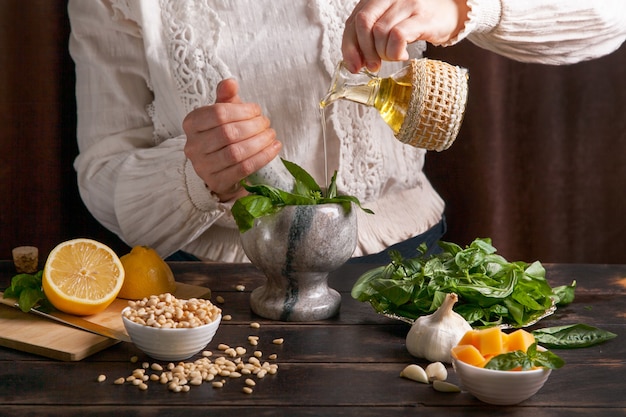Ask Ayurvedic doctor a question and get a consultation online on the problem of your concern in a free or paid mode. More than 2,000 experienced doctors work and wait for your questions on our site and help users to solve their health problems every day.
Fibroadenoma Ayurvedic Treatment – Natural Remedies & Holistic Healing

Introduction to Fibroadenoma Ayurvedic Treatment
Fibroadenoma Ayurvedic treatment offers a natural and holistic approach to managing fibroadenoma, a common benign breast condition characterized by noncancerous lumps in the breast tissue. Rooted in ancient Ayurvedic principles, these treatments focus on balancing the body's doshas, eliminating toxins, and promoting overall breast health. By integrating Ayurvedic remedies and lifestyle modifications, individuals can effectively alleviate symptoms, prevent recurrence, and enhance their well-being through time-tested practices.
Don't wait or self medicate. Start chat with Doctor NOW
Understanding Fibroadenoma & Its Ayurvedic Perspective
In Ayurveda, fibroadenoma is perceived as an imbalance primarily in the Kapha and Vata doshas, often resulting from hormonal fluctuations, stress, or accumulation of toxins (ama) in the body. The condition manifests through the presence of firm, painless lumps in the breast, which can cause emotional distress and discomfort. Ayurvedic treatment for fibroadenoma emphasizes detoxifying the body, regulating hormonal levels, and restoring doshic harmony to facilitate healing and prevent future occurrences.
Key Components & Therapeutic Benefits
1. Herbal Remedies
Ayurveda utilizes a variety of herbs known for their hormone-regulating, anti-inflammatory, and healing properties to treat fibroadenoma:
- Ashwagandha (Withania somnifera): Balances hormones, reduces stress, and supports overall hormonal health.
- Shatavari (Asparagus racemosus): Enhances female reproductive health, regulates menstrual cycles, and strengthens breast tissue.
- Turmeric (Curcuma longa): Contains curcumin, which has strong anti-inflammatory and antioxidant properties, aiding in reducing inflammation and promoting healing.
- Neem (Azadirachta indica): Possesses detoxifying and antimicrobial properties, helping to cleanse the body of toxins.
- Manjistha (Rubia cordifolia): Purifies the blood, eliminates toxins, and supports skin and breast health.
2. Dosha Balancing & Detoxification
Ayurvedic treatments aim to balance the aggravated Kapha and Vata doshas through dietary adjustments, herbal supplements, and detoxifying practices. Reducing the intake of heavy, oily, and processed foods while increasing the consumption of light, dry, and warm foods helps in restoring balance. Detoxification therapies like Panchakarma may be recommended to eliminate toxins and enhance the body’s natural healing abilities.
3. Topical Applications & External Therapies
Applying herbal pastes and oils is a common Ayurvedic practice for treating fibroadenoma:
- Shatavari and Turmeric Paste: A paste made from shatavari powder and turmeric can be applied to the affected area to reduce inflammation and support tissue health.
- Aloe Vera Gel: Regular application of pure aloe vera gel helps in soothing the skin and promoting healing.
- Sesame Oil: Massaging with warm sesame oil can improve blood circulation and nourish breast tissue.
4. Lifestyle Modifications & Hygiene Practices
Adopting proper lifestyle and hygiene habits is crucial in managing fibroadenoma. Ayurveda recommends:
- Regular Exercise: Engaging in yoga and other physical activities to reduce stress and maintain hormonal balance.
- Stress Management: Incorporating practices like meditation and pranayama to manage stress, which can exacerbate doshic imbalances.
- Balanced Diet: Consuming a diet rich in fresh fruits, vegetables, whole grains, and adequate hydration to support overall health.
- Avoiding Toxins: Limiting exposure to environmental toxins and avoiding smoking and excessive alcohol consumption.
How Fibroadenoma Ayurvedic Treatment Works: The Science Behind the Practices
Ayurvedic treatments for fibroadenoma operate on the principles of dosha balance, toxin elimination, and natural healing. The herbal remedies used contain bioactive compounds that exhibit hormone-regulating, anti-inflammatory, and antioxidant effects, effectively reducing symptoms and promoting tissue repair. By addressing the root causes of doshic imbalance and enhancing the body’s innate healing mechanisms, Ayurvedic treatments provide a comprehensive and sustainable approach to managing fibroadenoma.
Choosing the Right Ayurvedic Remedies & Guidance
When selecting Ayurvedic treatments for fibroadenoma, consider the following:
- Consult Certified Ayurvedic Practitioners: Personalized guidance ensures that treatments align with your specific constitution (Prakriti) and health needs.
- Quality of Herbs: Use high-quality, organic herbs to maximize safety and therapeutic benefits.
- Reputable Sources: Purchase Ayurvedic products from trusted vendors or certified practitioners to ensure authenticity and proper formulation.
Recommended Dosage & How to Use Fibroadenoma Ayurvedic Treatments
The dosage and application methods for Ayurvedic treatments may vary based on individual conditions. Generally:
- Herbal Decoctions: Follow the prescribed dosage, typically 1-2 teaspoons taken with warm water, twice daily.
- Topical Applications: Apply herbal pastes or oils gently to the affected area 2-3 times daily.
- Dietary Adjustments: Incorporate recommended dietary changes consistently to support treatment.
- Professional Guidance: Always adhere to the advice of an Ayurvedic practitioner to customize the treatment plan to your needs.
Potential Side Effects & Precautions
While Ayurvedic treatments are generally safe, it is essential to consider the following precautions:
- Allergic Reactions: Discontinue use if you experience irritation or allergic reactions to any herbal ingredients.
- Pregnancy & Nursing: Consult an Ayurvedic practitioner before starting any treatment if you are pregnant or nursing.
- Underlying Health Conditions: Individuals with certain health conditions should seek professional advice to avoid adverse interactions.
- Proper Application: Ensure correct application of topical treatments to prevent skin irritation.
Frequently Asked Questions For Fibroadenoma Ayurvedic Treatment
How does Ayurveda treat fibroadenoma effectively?
Ayurveda treats fibroadenoma by addressing the root causes of doshic imbalance through herbal remedies, detoxification, and lifestyle modifications. By using hormone-regulating and anti-inflammatory herbs, improving dietary habits, and managing stress, Ayurvedic treatments alleviate symptoms and promote healing.
What are the best Ayurvedic herbs for fibroadenoma?
Key Ayurvedic herbs for fibroadenoma include ashwagandha, shatavari, turmeric, neem, and manjistha. These herbs possess hormone-regulating, anti-inflammatory, and detoxifying properties that help reduce symptoms and support breast health.
Can fibroadenoma be prevented through Ayurveda?
Yes, Ayurveda emphasizes preventive measures such as maintaining proper hormonal balance, following a balanced diet, managing stress, and using herbal supplements to strengthen the body. These practices help prevent the occurrence and recurrence of fibroadenoma.
Are there any dietary recommendations for fibroadenoma Ayurvedic treatment?
Yes, Ayurveda recommends a diet that avoids heavy, oily, and processed foods. Instead, focus on consuming fresh fruits, vegetables, whole grains, and foods that help balance the aggravated doshas and support overall hormonal health.
How long does it take to see improvement with Ayurvedic treatment for fibroadenoma?
The time to see improvement varies based on the severity of the condition and individual responses to treatment. Some individuals may experience relief within a few weeks, while others may require several months of consistent treatment for significant improvement.
Is Ayurvedic treatment for fibroadenoma safe for everyone?
While Ayurvedic treatments are generally safe, it is important to consult a certified Ayurvedic practitioner, especially if you have underlying health conditions, are pregnant, or are breastfeeding, to ensure the treatments are appropriate for your specific situation.
Where can I find authentic Ayurvedic treatments for fibroadenoma?
Authentic Ayurvedic treatments for fibroadenoma can be obtained from certified Ayurvedic practitioners, reputable Ayurvedic clinics, and trusted online vendors specializing in Ayurvedic medicines. Always ensure the source is reputable to guarantee the quality and effectiveness of the treatments.
Conclusion & Expert Insights
Fibroadenoma Ayurvedic treatment offers a natural and comprehensive approach to managing and healing fibroadenoma by focusing on dosha balance, toxin elimination, and holistic well-being. By leveraging the power of traditional herbs and lifestyle practices, Ayurveda provides effective relief from symptoms and supports long-term breast health. Consulting with qualified Ayurvedic professionals and adhering to personalized treatment plans can lead to successful management and prevention of fibroadenoma, promoting overall health and vitality.
References & Further Reading
- Sharma, P.V. (1995). Ayurvedic Healing: A Comprehensive Guide.
- Lad, V. (2002). Ayurveda: The Science of Self-Healing.
- National Institute of Ayurveda:
- Journal of Ayurveda and Integrative Medicine for research articles on Ayurvedic treatments for breast health.



